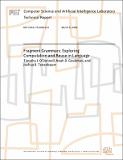Fragment Grammars: Exploring Computation and Reuse in Language
Author(s)
O'Donnell, Timothy J.; Tenenbaum, Joshua B.; Goodman, Noah D.
DownloadMIT-CSAIL-TR-2009-013.pdf (1.617Mb)
Additional downloads
Other Contributors
Computational Cognitive Science
Advisor
Joshua Tenenbaum
Metadata
Show full item recordAbstract
Language relies on a division of labor between stored units and structure building operations which combine the stored units into larger structures. This division of labor leads to a tradeoff: more structure-building means less need to store while more storage means less need to compute structure. We develop a hierarchical Bayesian model called fragment grammar to explore the optimum balance between structure-building and reuse. The model is developed in the context of stochastic functional programming (SFP) and in particular using a probabilistic variant of Lisp known as the Church programming language (Goodman, Mansinghka, Roy, Bonawitz, & Tenenbaum, 2008). We show how to formalize several probabilistic models of language structure using Church, and how fragment grammar generalizes one of them---adaptor grammars (Johnson, Griffiths, & Goldwater, 2007). We conclude with experimental data with adults and preliminary evaluations of the model on natural language corpus data.
Date issued
2009-03-31Citation
O'DONNELL, T., GOODMAN, N., and TENENBAUM, J. 2009. Fragment Grammars: Exploring Computation and Reuse in Language. MIT Computer Science and Artificial Intelligence Laboratory Technical Report Series, MIT-CSAIL-TR-2009-013.
Series/Report no.
MIT-CSAIL-TR-2009-013
Keywords
Language, Stochastic Functional Programming, Stochastic Memoization, Reuse, Lexicon, Hierarchical Bayes
Collections
The following license files are associated with this item: